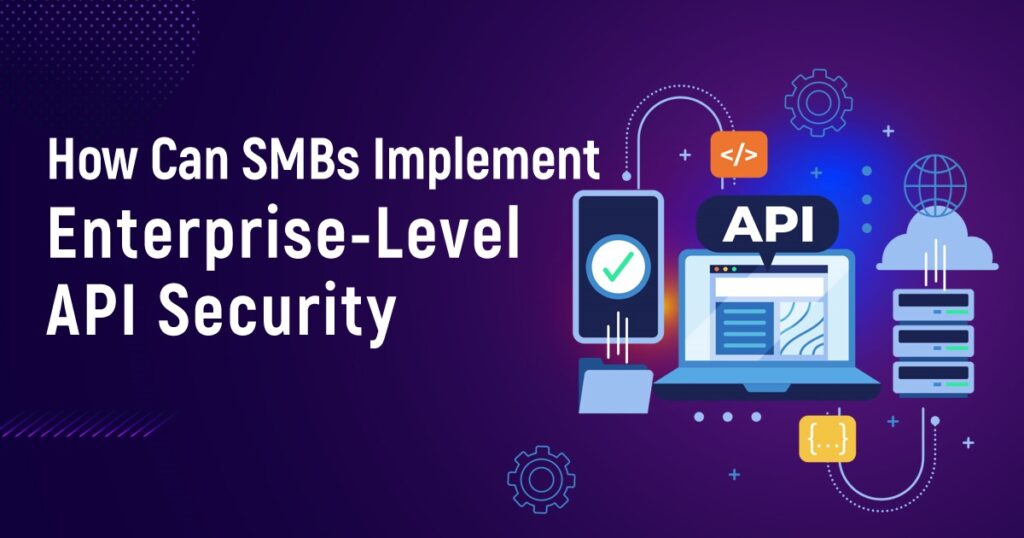In today’s interconnected digital world, enterprise-level API security is critical for businesses of all sizes, particularly small to medium-sized businesses (SMBs). APIs (application programming interfaces) are the backbone of modern applications, allowing for integration, data exchange, and seamless cross-platform functionality.
However, with this convenience comes the responsibility to ensure these APIs are secure, as they are increasingly becoming a target for cyber threats. Implementing enterprise-grade API security can seem challenging for SMBs, but taking the right measures is essential for safeguarding sensitive information and maintaining customer trust.
The Importance of Enterprise-Level API Security for SMBs
The Rising Threat Landscape
Various businesses turn to more digital strategies cyberattacks targeting APIs are increasing in frequency and sophistication. According to Ponemon’s 2023 Cybersecurity Report, API breaches increased 117% last year. This alarming trend highlights the need for strong API security practices, especially for SMBs lacking extensive resources. But still, handle important information.
Common API Security Challenges for Small to Medium Businesses
To effectively secure the API It’s important to understand common vulnerabilities that cybercriminals can exploit:
-
Insufficient Authentication: Without a strong authentication mechanism in place, Unauthorized users can easily access the API.
-
Information Exposure: APIs that do not properly validate their input or output can inadvertently expose sensitive information through detailed error messages or unsafe endpoints.
-
Inadequate rate limiting: APIs without rate limiting can be vulnerable to denial of service (DoS) attacks, leading to service disruptions.
Best Practices for Implementing Enterprise-Level API Security

1. Establish Comprehensive Visibility and Control
Visibility into API traffic is fundamental to identifying and mitigating threats. Using an API management platform can provide real-time analytics. Tracking and logging capabilities help SMBs detect anomalies and unusual patterns in API usage. Additionally, implement a regular schedule for code reviews and security assessments.
2. Implement Strong Authentication and Authorization Protocols
Securing an API starts with a strict authentication and authorization process. It uses industry-standard protocols such as OAuth 2.0 and OpenID Connect, which provide secure delegated access. And allows users to authenticate without revealing their credentials.
-
Best Practices:
-
Multi-factor Authentication (MFA): Enforce MFA to add an additional layer of security for users accessing sensitive APIs.
-
Principle of Least Privilege: Limit API access to the minimum privileges required for users and applications.
3. Ensure Data Protection Through Encryption
Data protection is paramount when dealing with sensitive information. Encryption protocols are used for data at rest and in transit to prevent unauthorized access and interception.
-
Current Best Practices:
-
TLS (Transport Layer Security): Ensure that all API communications are encrypted using TLS to prevent data interception in transit.
-
Data Masking: Use data masking techniques to mask sensitive information in API responses.
4. Employ Rate Limiting and Throttling Mechanisms
Rate limiting and throttling are important to prevent abuse and protect APIs from excessive requests. These measures can reduce the risk of DoS attacks and help maintain service availability.
-
Implementation Strategy: Limit API calls based on usage patterns and adapt to application needs. Tools that allow dynamic rate limiting can adapt to real-time traffic conditions.
5. Conduct Regular Security Audits and Penetration Testing
Regular security audits and penetration tests are essential to identify vulnerabilities in your APIs. These proactive measures allow businesses to patch vulnerabilities before they are exploited. Additionally, implement a regular schedule of code reviews and security assessments.
Enterprise-Level API Security on a Budget
Real-Time Threat Detection and Mitigation
Real-time threat detection capabilities can be obtained by using an advanced monitoring solution, enabling SMBs to react swiftly to possible attacks. Analyzing API traffic patterns and detecting anomalies with machine learning and artificial intelligence tools. Helps to respond quickly to events.
Develop an Incident Response Plan
Having a clearly defined incident response plan is essential to minimizing damage in the event of a security breach. This plan should outline roles and responsibilities for team members. Method of communication and procedures for quarantine and recovery.
Role of Prophaze in Securing APIs for SMBs
Because SMBs want to implement these strategies, partnering with an experienced security provider can significantly increase the level of API security. Prophaze offers a suite of solutions tailored to meet the unique needs of small and medium-sized organizations:
Comprehensive API Security:
Prophaze provides a robust API security framework that includes real-time threat identification. Automated policy enforcement and advanced analytics. This allows businesses to maintain visibility and control over their API interactions, ensuring they can quickly identify and respond to threats.
Advanced Protection Against Vulnerabilities:
Prophaze’s solution is designed to protect against common API vulnerabilities, such as insufficient authentication. Leveraging modern technologies and methods, Profage helps SMBs strengthen their API security.
Scalable Solutions:
Designed to grow your business, Prophaze’s solutions can scale to support increasing API traffic and complexity. Whether your business is starting to work on an API or expanding its digital footprint, Prophaze ensures that its security measures remain effective as your business grows.
Expert Support and Guidance:
Prophaze offers unmatched expertise and support, helping SMBs navigate the complex landscape of API security. With a focus on customer success, it helps businesses adopt best practices and protect their data.
Tailored Security Solutions:
Prophaze understands that every business has different needs. Works closely with SMBs to develop customizable security solutions that meet their specific operational requirements. To ensure that security measures are effective and manageable.
Ready to Secure Your APIs with Enterprise-Level Protection?
Implementing enterprise API security isn’t just for large organizations. Small and medium-sized businesses can and should adopt these practices to protect sensitive data and build customer trust. By prioritizing vision Strong authentication, data protection, Rate limiting, and continuous monitoring SMBs can create flexible security measures.
Watch our latest podcast on YouTube to learn more about improving API security and hear insights from experts. Explore Prophaze’s API security solutions today and take the first step towards protecting your business from ever-changing cyber threats.








